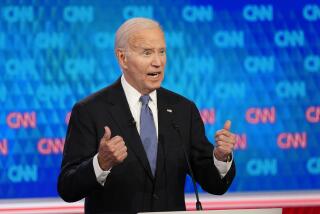Lieberman to Keep Pressure on TV
- Share via
Sen. Joseph I. Lieberman, who downplayed his role as a Hollywood watchdog during this week’s Democratic convention, said in an interview Thursday that he will continue to press the television industry for tougher standards on violent and sexually explicit programming as he campaigns for vice president.
Broadcasters need “to draw some lines to protect particularly our children from the wrong messages about violence and sex,” Lieberman said, speaking to The Times in a suite at the Regal Biltmore Hotel. “We don’t want to get into governmental censorship, and that’s why we keep appealing to the entertainment industry to self-regulate.”
Last May, Lieberman joined Sen. John McCain (R-Ariz.) and two other senators in a letter asking Federal Communications Commission Chairman William E. Kennard to include program content--such as violent and sexually explicit scenes--as part of the “public interest” test that broadcasters must meet when their licenses are renewed. The letter also asked for the FCC’s support in urging the broadcast industry to adopt a voluntary code of conduct.
On Thursday, a spokesman for the senator said Lieberman expects to receive a “positive” response from Kennard soon.
“We expect the FCC to say that the best solution to balance 1st Amendment rights and public interest opportunities is to have a code of standards, self-adopted,” said Dan Gerstein, Lieberman’s communications director. “We’re not interested in evaluating program content in determining whether people get renewed licenses. We want to avoid the government being a program monitor. . . . The idea is to have a code of conduct serve as a proxy for government regulation.”
The effect would be a new shot across the industry’s bow--a stiffer warning to enact a voluntary code, not a direct change in the actual process of license renewal, Gerstein said. It would also be a major boost for Lieberman’s crusade against violent and sexually explicit programming on television--an issue he appeared to downplay during his week at the Democratic convention, which included many of the party’s entertainment industry contributors.
An FCC official who insisted on anonymity said he could not confirm Kennard’s response to the Lieberman letter. He said, however, that there is an ongoing public inquiry about the public interest obligations of broadcasters seeking renewal of FCC licenses. He did not say when that inquiry would be closed.
When the Lieberman-McCain letter surfaced last May, executives with the television networks and the National Assn. of Broadcasters declined to comment on it. They were unavailable Thursday evening to comment on the latest developments.
The letter last May from the four senators asked the FCC’s opinion on reinstituting a voluntary code of conduct like the old National Assn. of Broadcasters TV Code, which was in force from 1952 to 1983. That code said the industry had a special responsibility to children. It called on broadcasters to avoid programming done “for the purpose of sensationalism or to shock or exploit the audience or appeal to prurient interests or morbid curiosity.”
In the interview Thursday, Lieberman also addressed another controversial topic, saying that based on his understanding of California’s Proposition 38, he would oppose the November ballot measure that would provide $4,000 to parents that they could use to pay for private education.
Lieberman, who has supported experimental school voucher programs in the past, said that because the California initiative is not limited to low-income children, its scope is too broad and could hurt the public school system.
“As I understand this proposition in California, it is not means-tested,” he said. “I can’t see how it would not drain the public schools of large amounts of their financial support. That’s why I would not support it. Our hope is that we should make our public schools excellent for all of our children, including the poorest children.”
He said he still backs demonstration programs that target low-income children and do not use public school funds, but said he looks at vouchers as “a temporary lifeline” for poor children, adding that his focus is on improving the public school system.
During the interview, the vice presidential nominee also sketched out his upcoming role on the campaign trail, saying he would continue the themes he set out during his speech at the Democratic National Convention on Wednesday night by pointing out the differences with the Republican ticket of George W. Bush and Dick Cheney. He also said he would talk about Al Gore “not as a politician, but as a family friend and a colleague.”
And he dismissed worries that the more liberal members of the Democratic Party would be left out by the centrist, “New Democrat” administration his ticket represents.
Lieberman called the New Democrat movement “an attempt to transcend some of the old categories and find common ground.”
The Clinton-Gore administration represented that philosophy, he added. “I think every part of the larger Democratic family has felt welcome and at home, and that’s what I hope and believe would be the case in a Gore-Lieberman administration.”
*
Times staff writer Jube Shiver Jr. and correspondent Jane Hall contributed to this story.
More to Read
Get the L.A. Times Politics newsletter
Deeply reported insights into legislation, politics and policy from Sacramento, Washington and beyond. In your inbox twice per week.
You may occasionally receive promotional content from the Los Angeles Times.











